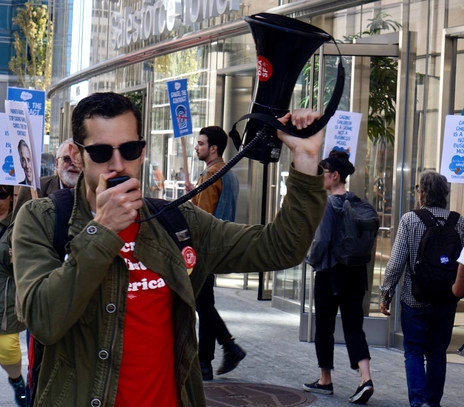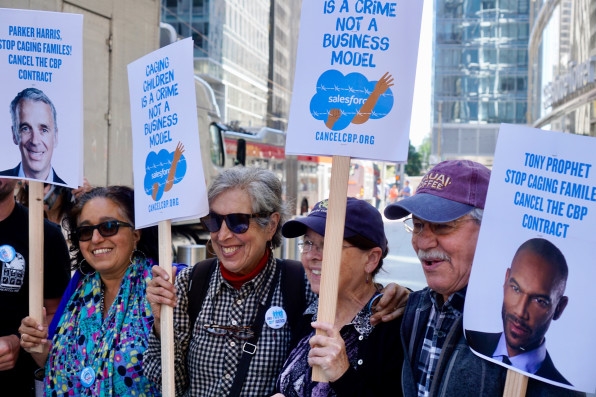Meet the Silicon Valley socialists who want to transfer power from billionaires to workers
“Caging children is a crime. Salesforce, fuck your bottom line!” chanted about 40 protestors on July 9 outside the new Salesforce Tower that looms over San Francisco’s East Cut neighborhood.
The chant encapsulates the sentiment of a growing number of tech industry employees, who’ve moved from apathy to activism in the last few years. They’re organizing on social media and rallying to protest company policies they disagree with and to express their opposition to controversial contracts with the U.S. government. That Monday, they were protesting a Salesforce contract to supply services to human resources operations at U.S. Customs and Border Protection (CBP), the sister division within the Department of Homeland Security to Immigration and Customs Enforcement (ICE)–the unit infamous for detaining children of asylum seekers.
The protest followed an online petition by over 650 Salesforce workers to cut the company’s ties with CBP. Similarly, over 100 Microsoft employees signed a letter to CEO Satya Nadella asking him to end the company’s deal to provide its Azure Government cloud service to ICE.
Underlying these and other actions, such as unionizing custodial workers, is a deeper philosophical strain–the “fuck your bottom line” part. A core of activists wants to do more than prompt reforms within the current economic framework of the tech industry. They aim to fundamentally remake both the power structure inside tech companies and the power dynamic between those firms and the communities in which they operate like San Francisco, Silicon Valley, and Seattle.

“What if Salesforce–instead of being a dictatorship where [CEO] Marc Benioff says, this is what we’re going to do–was a cooperative where all the workers got a say, got to vote?” asks Steven Goldberg, a tech worker who had been leading the chant with a megaphone.
Goldberg wears a red T-shirt with the words “Democratic Socialists of America” in white letters across the front. Bernie Sanders popularized the term “democratic socialism” during his presidential run. He described it as an extension of the New Deal and the Great Society, with the rights such as healthcare, advanced education, and living wages–enabled by government regulations and higher taxes on the wealthy and corporations.
But the DSA, boosted by Alexandria Ocasio-Cortez’s upset victory in the primary for New York’s 14th congressional district, goes beyond the philosophy of Sanders or European social democracies that function within the framework of regulated capitalism. The long-term goal of the DSA, according to its site, is to eventually “eliminate private corporations” through the introduction of worker-owned cooperatives or publicly owned enterprises.
“We shouldn’t have this system where we have a few people–your Benioffs, your Bill Gates, your Elon Musks, your Jeff Bezos–controlling vast amounts of wealth,” says Goldberg.
He sometimes joins actions organized by the Tech Workers Coalition. The group popped up in 2015 to facilitate dialogue between longtime residents of San Francisco and newly arrived tech workers inundating their neighborhoods. “It seemed like there wasn’t a logical touchpoint for people in the tech industry who wanted to engage with these communities,” says Matt Schaefer, a user interface designer who cofounded the group after a conversation with Peter Gabel, a professor and community organizer in the city’s Noe Valley neighborhood. “Right now the voice of the industry seems to be CEOs and venture capitalists, but there’s no voice of workers,” says Schaefer at our first meeting in April 2017.
TWC membership grew rapidly after the election of President Trump. It has expanded with regular meetings and events now in both the Bay Area and Seattle. Working with labor organizations like the SEIU and Silicon Valley Rising, TWC has gone on to support unionizing efforts for contractors at tech companies– the outsourced security guards, cafeteria workers, bus drivers, and others, who miss the generous pay and cushy perks of full-time engineers and marketers. TWC members working at tech companies, for instance, distributed pro-union literature to contract workers on campus.
The group is also joining in antigovernment campaigns.
In June, after a half-year internal effort of blog posts, internal meetings, petitions, and resignations, Google employees persuaded the company not to renew, in 2019, its contract with U.S. Department of Defense’s Project Maven to provide analysis of drone footage.
During the campaign, the TWC launched a companion petition in April to solicit support from workers at Google, and extend the anti-military campaign to Amazon, Microsoft, and IBM.

Karl Marx in the Valley
The Tech Workers Coalition has attracted a variety of activists, including communist revolutionaries. “More and more tech workers are unifying and organizing around a shared disillusionment with the entrepreneurial and libertarian ethos of Silicon Valley elites, and the realization that their interests are not the same as their bosses.” So writes control systems engineer and TWC member RK Upadhya in a January 2018 Medium essay about the Coalition’s support for “platform workers”–freelancers on systems like Uber and TaskRabbit. He proposes worker-owned platforms as an alternative.
Upadhya also describes the “workers’ inquiry” meetings TWC has been convening, “designed to help us understand each other’s positions in capitalism.” The practice, he says, is inspired by the efforts of Italian communists in the 1960s and 1970s and by today’s communist and Marxist organizations Angry Workers of the World and Viewpoint Magazine. (I reached out to Upadhya through TWC and social media but have not heard back.)
In August 2017, TWC members took part in labor organizer training with the Industrial Workers of the World. That organization’s constitution describes a division into workers and employers, and states that, “Between these two classes a struggle must go on until the workers of the world organize as a class, take possession of the means of production, abolish the wage system, and live in harmony with the Earth.”
“There are people who are more on that political leaning, like RK Upadhya and others; and there are others who are ordinary tech workers, and everyone in between,” says a TWC member who spoke on condition of anonymity. Many tech workers fear retaliation from employers, who often require that employees refrain from making public political statements, so TWC gives its spokespeople the option to be anonymous.
In contrast to Occupy Wall Street, where the insistence on consensus made it hard for organizers to say something definitive, TWC’s support of diverse views makes it easy to say almost anything.
Still, there is a strong socialist strain in the TWC that challenges the libertarian ethos of the tech world. “It’s pervasive,” one member tells me.
“I just believe that workers should have the seat at the table for deciding what kind of contracts we sign and what kind of products we build,” says TWC volunteer Stephanie Parker at the Salesforce protest. That’s a radical realignment: Corporations make no pretense of being democracies. They typically focus on maximizing earnings and share price, not satisfying ethical demands of workers.
As for redistributing wealth from billionaires to workers and communities, Parker says simply, “The big tech companies are not paying their fair share in taxes. Let’s fix that first.”
These calls are not restricted to the TWC, either. “Personally I do believe in the redistribution of wealth,” says Kevin Ortiz, a tech worker and officer in the Latino Democratic Club. (This is not an official club position, he emphasizes.) “I believe that we need to hold tech companies accountable and that we need to tax the hell out of them,” he adds. His organization does support a ballot initiative that would levy a new tax on the biggest San Francisco companies to fund aid to the homeless.
Though not canon, the idea of class warfare is firmly rooted in the TWC. “I think it was important to a lot of the people who would take part in our gatherings and our events, but I can’t say it was a part of any sort of official position,” says Matt Schaefer, in a conversation we had last week. He left TWC in late 2017 for what he says were personal, not ideological reasons.
The coming high-tech culture war
It’s tempting to see a protest or petition as evidence of a “movement,” but it may represent only a sliver of the constituency. Yes, Salesforce employees spoke out against the CBP contract, but they make up fewer than 700 out a workforce of over 30,000. (Alphabet, which owns Google, has over 85,000 employees; Microsoft has over 124,000.)
Were more workers inclined to support the petition but didn’t sign it out of fear of employer retribution? Conversely, were people opposed to it but nervous about facing the wrath of their coworkers?
“The Bay Area is pretty progressive, but I would actually say that the people doing the activism are not representative of [the] technology [industry],” says Brad Taylor, a software engineer who cofounded Tech Stands Up in 2017. The group began with a rally in March of that year, aiming to bring the engineering class together with labor and community activist groups adversely affected by the tech boom.

“Tech . . . is primarily white men. And to be honest, you don’t see a lot of white men [at TWC meetings], which leads me to believe that, yeah it is a small minority that is driving this,” says Taylor, who calls his personal philosophy, “more libertarian, if anything.” He’s been reconfiguring Tech Stands Up from an activist group to one providing technology resources for nonprofit organizations.
“Silicon Valley has always been a community that has a lot of contradictions,” says a former tech executive speechwriter who asked that I not use his name. “It’s a place that talks about changing the world, but it’s also a place with this very strong libertarian streak and often distrust about the political route to changing things.”
However, he says that the policies of the Trump administration on issues such as immigration are starting to change that attitude. “More and more tech workers–none of whom could possibly be labeled as extremists in any way, many of whom are incredibly moderate, many of whom are Republicans, Democrats, and none of the above–they’re coming out and choosing to take a stand,” he says.
That’s one view. Those on the right feel that progressives are hijacking the conversation, intimidating people with conservative views. “I would say there is a large number people who agree with our views but don’t necessarily feel safe to express themselves,” says Aaron Ginn, cofounder and president of the self-described center-right Lincoln Network, an organization fostering dialogue between government and the tech sector. He believes that the far-left is exerting social pressure that intimidates conservatives in tech from speaking their minds, and even alienating some on the center-left.
“There are a lot of liberals I know that are totally appalled by what’s going on . . . like people who voted for Hillary Clinton and voted for Barack Obama,” says Ginn, a Republican activist and former growth manager at companies like StumbleUpon and Everlane. “People I know who worked for Obama’s tech team are like, ‘What is going on?’ They feel like they have lost control, as well.”
Ginn points to Lincoln Network’s five-week tech worker survey, concluded on January 6. It found something of a bell curve in political orientation of respondents, with the lowest numbers identifying as very liberal (11%) or very conservative (5%) and the biggest portion (24%) describing themselves as libertarian–which it places near the center of the spectrum.
Yet all the respondents described their companies–including Amazon, Google, Microsoft, and Salesforce–as being liberal or very liberal. Those answering that the culture makes them “hesitant to be yourself at work” slants steeply up to the right, from 30% among the very liberal to 89% among the very conservative.
But the survey represents just a small sliver of the community, since it includes only 387 participants, 84% of them male. “Respondents were a self-selected group; many likely took the survey because of what they perceived to be challenging political environments in their workplaces,” the authors concede.
The extent of left-oriented views is also hard to judge, since activist workers fear repercussions for speaking out. Typically classified as “at-will” employees, they can be dismissed for any reason, without the need to establish “just cause.” Those who do act walk a dangerous line–organizing public events but not wanting to be publicly identified. In addition to people not giving out names or identifying employers, I met one woman at the Salesforce protest who turned or ran away anytime I photographed the group.
“There’s definitely lots of motivation inside the companies on particular issues. It just depends,” says Brad Taylor. “I’ve seen people not do anything inside companies, but then when a certain issue comes up I’ve seen them jump into it.”
Tech workers who spring into action on issues like Project Maven or support for ICE may or may not share the belief that their company’s entire decision-making structure should be democratized so they can weigh in on other contract issues. Their involvement could be a one-off thing.
“It’s kind of like activism when it’s convenient,” says Taylor. While he’s alarmed at tech’s involvement in the military and immigration enforcement, Taylor would also like to see tech workers make a long-term commitment to social and economic equity in their communities, to those directly affected by the tech boom. “How do we take these people who have these cush jobs,” he asks, “and have them stand up for the people who are less fortunate?”
(25)

